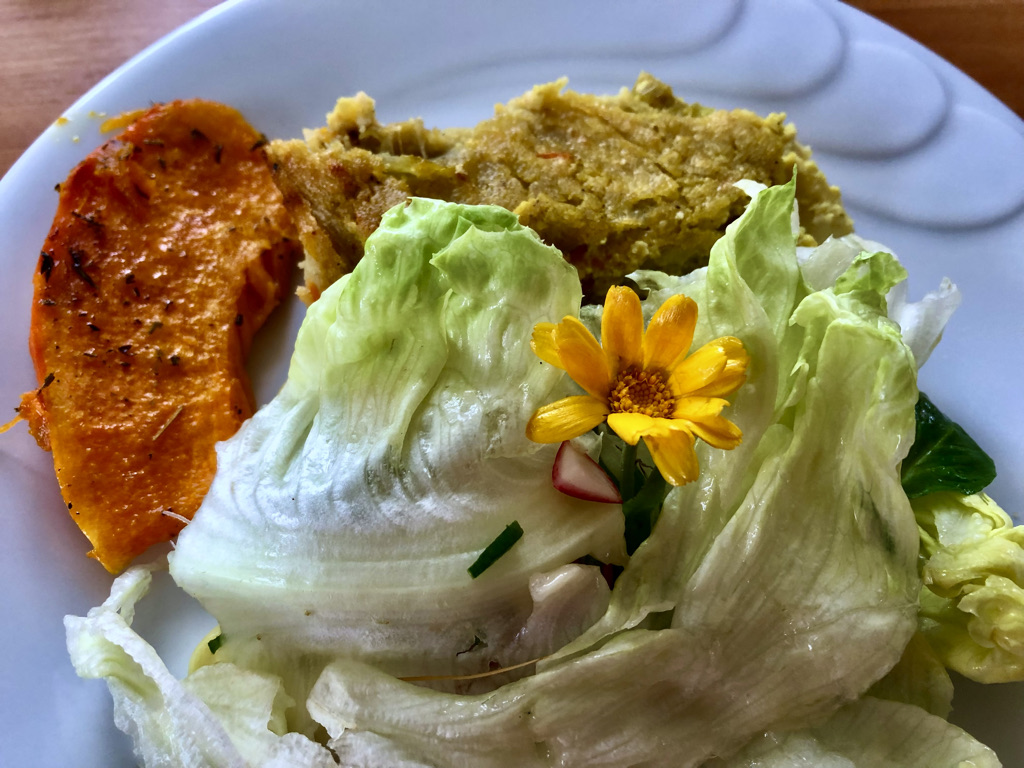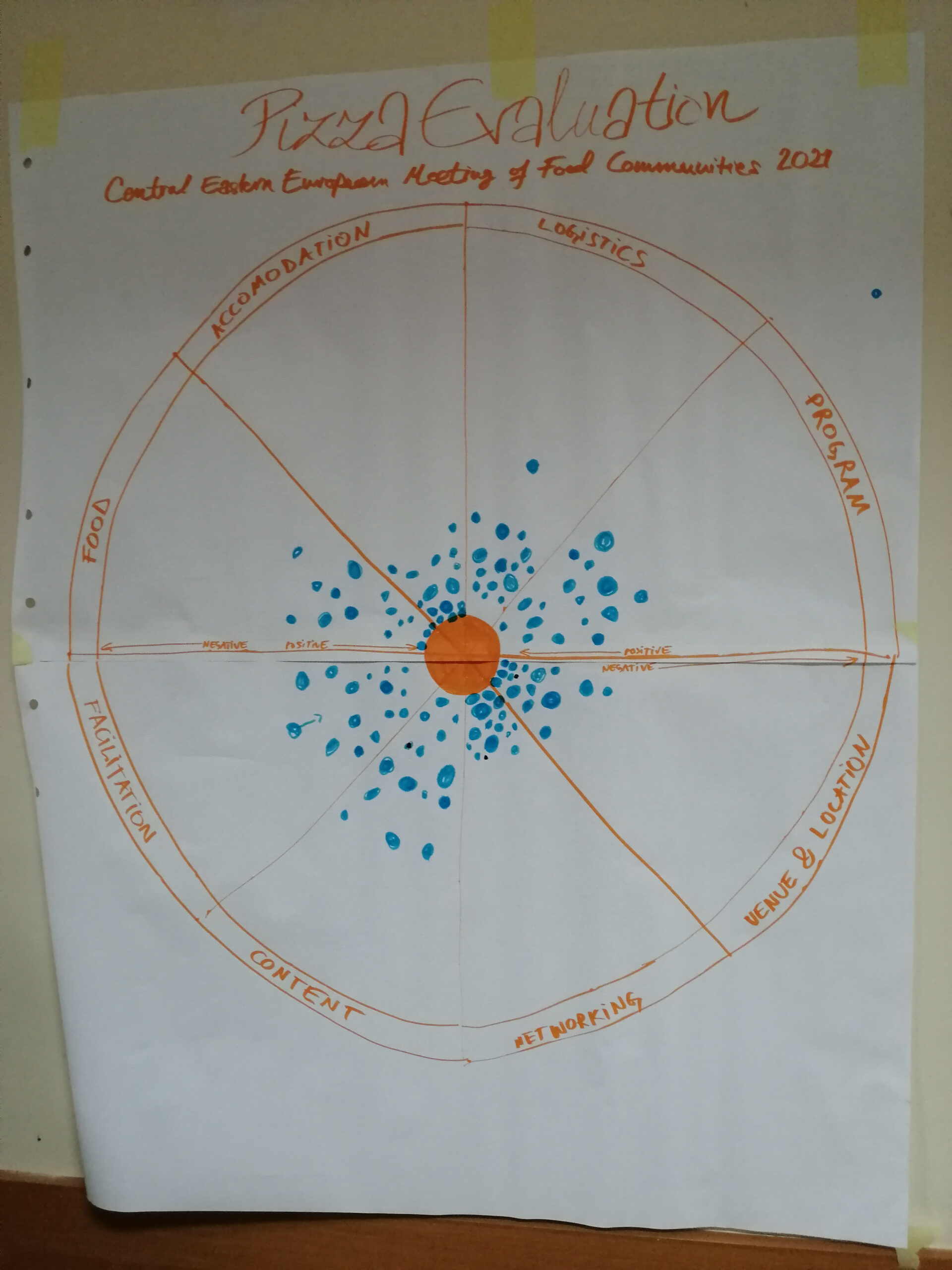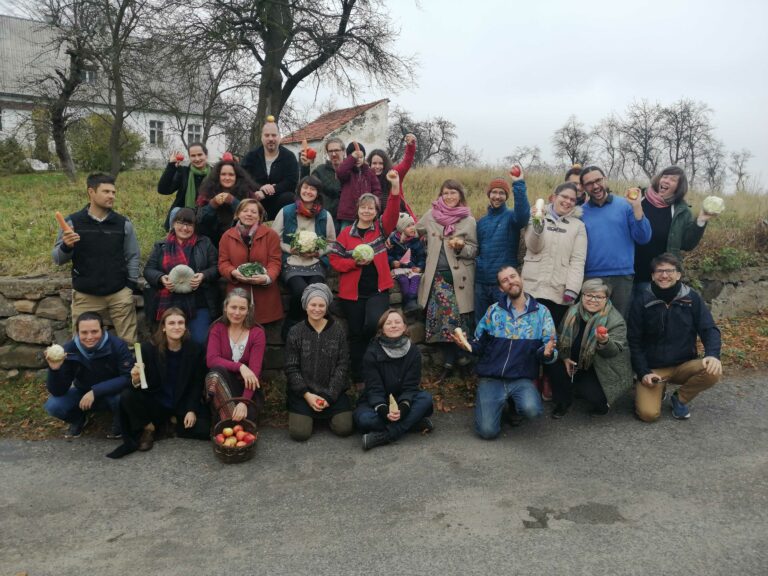EkoCentrum Wrocław, Poland
Bird Valley – Creative Meeting House, Nowa Wieś Wielka
12-14.11.2021
Day 1
The Central and Eastern European meeting of CSA brought together participants from the Czech Republic, Poland, Slovakia, Hungary, Austria, France, and the UK. The first part of the event took place at the Environmental Education Centre EkoCentrum Wrocław, in the surroundings of a green autumn garden. We got to know each other through stories about our food experiences, but also through the plans and dreams we had for the meeting. There were opportunities for longer one-to-one conversations, for integrative and activating exercises, and for a shared vegan meal. In a break from the discussion, we tasted juices made from old apple varieties, offered to us by the Rezerwat Jabłek.
During the first presentations, Monika, Sam and Zsofi talked about local food initiatives and solidarity-based initiatives. They pointed out that one of the main activities used to strengthen social movements is mentoring, aimed at both food citizens as well as staff and trainers. For example, URGENCI uses e-learning, personal mentoring, and online webinars in its activities.
In Wojtek’s presentation we learned about the Dobrze Food Cooperative in Warsaw. The cooperative currently employs 15 people, runs two shops, is open to non-members, and numbers 450 members. It offers local products, but also, for example, bananas or coffee from the Zapatista cooperative. The variety of products stems from the desire to be an alternative to supermarkets, where you can get various type of imported goods. The members of the cooperative maintain democratic governance within the association. They collaborate with around 40 different farms which sometimes creates strong, almost family-like, ties.
During the next presentation, Tereza introduced the HOJNOST initiative, operating in Tišnov, Czech Republic. In 2012, a group of people founded the CSA, in cooperation with one farmer. They use abandoned fruit orchards to demonstrate how to identify local apple varieties or assess the condition of the trees. Between 2013 and 2017, the community operated as an informal initiative, meeting twice a week. In 2017, they founded an association. HOJNOST tries to follow the idea of zero waste: they use glass, reusable packaging, and order only dried products from wholesalers while sourcing fresh ones from the local market.
In the next presentation, Anča talked about her CSA, which she co-leads together with another person near Ostrava. The initiative was founded four years ago and Anča has been active in it for a year. The CSA includes 12 families. Their 1,000-square-metre field is located on private land. The coordinators see the current phase as a time of learning and experimentation. There are plans to set up an association next year.
Honza, in turn, talked about the history of organic farming and how organic food as a market niche slowly entered supermarkets while public attitudes towards it shifted. Honza shared his experiences of working with URGENCI and indicated that one of the problems he encountered was the sceptical attitude towards co-operative ideas among farmers.
Jocelyn presented the results of a study on the functioning of food communities during
the pandemic, which showed that 90% of them maintained their continuity, even during the lockdown period. Within the strategies adopted by the CSA, there are three that point to the resilience of such initiatives: recognition (resulting from higher demand for local food), support for marginalized people, and solidarity towards the producers. We ended the day by reflecting on the question: “What do we need as farmers and food communities to reboost after 2 years under covid?”. We worked on the answers in groups.
For the group associated with Polish initiatives, it was important to expand the range of products for sale, to work with new farmers, and to prevent energy burnout among activists. We debated about educating consumers in the solidarity economy and the social costs of production. In the group related to Hungary, there was also the need to educate – as well as to create model collaborations – between farmers from different backgrounds. Among those who worked with initiatives within the Czech Republic, the issue of migration from the city to the countryside emerged, as well as a greater interest in agriculture. The idea of umbrella organisations that would link different initiatives across the country was also discussed.
In the evening we arrived in Nowa Wieś Wielka and were greeted by the hosts of the “Bird Valley” Creative Meeting House, Danuta and Dariusz. A lunch prepared with local produce awaited us at the community centre.

Day 2
The next day started with a visit from the head of the Paszowice commune. He spoke about the Kaczawy area we were staying in, where the forests were located, and the farmland and landscape park nearby. In his short greeting, the mayor emphasised the importance of cultural diversity and mutual understanding. He stated that, in his opinion, ecological solutions will be one of the directions for the development of agriculture.
During the first presentation, Sam discussed the e-learning methods used by URGENCI. We also talked about our previous experiences with e-learning. These were positive, but also evoked “mixed feelings” relating in part to the need for self-discipline. Ultimately, we found it particularly challenging to ensure connection and intimacy during web-based training. Sam presented a tool used by URGENCI – the Learning Village. Within the Learning Village, organisers and partners can share their learning materials (tool kits, databases, resources for training), and use a platform for online courses. In the upcoming course, aimed at food citizens, both individual work and live sessions with facilitators are planned. We held
a discussion on e-learning using the world cafe method and came to the following conclusions.
What are our needs? What dimension of building food community should be addressed by our training programs?
- social responsibility and resilience
- involvement in joint activities of different social groups: farmers, agricultural workers, consumers, experts
- sharing of implemented practices and personal experience (through different forms, e.g. storytelling)
- acquiring soft skills in areas such as communication, cooperation, building honest relations, conflict-solving, promotion, marketing
- developing innovative platforms and working methods, e.g. using gamification, icebreaking
- strategic planning meetings with facilitation, e.g. for network development
- reference to common experiences of initiatives from Central and Eastern European countries
- self-care education for activists, leaders, farmers
- reaching out to more people and other social groups: elderly, minorities
- ensuring the accessibility of the activities
- interchangeability of functions of facilitator and trainer
- raising funds and rewarding the work of trainers
- reaching out to mainstream channels
How is mentoring implemented in your networks? What are the responsibilities of mentors? Who is a mentor? How to choose a mentor?
- mentoring can accompany the introduction of new members
- it can be peer-to-peer
- it can be topic-based, addressing solidarity economy issues, and reaching out to consumers
- mentors should also receive support to improve their competences (including financial support)
- the transfer of knowledge can take place from farmers to members and between farmers (mentoring more often concerns consumers than farmers)
- it can bring together different perspectives: practitioners, academics, activists
- it can take the form of informal meetings and critical discussions
- consultations for farmers currently include transfer to organic production and come from the governmental level; mentoring can also concern financial management on farm and be carried out by external experts
- mentoring can be embedded in specific regional conditions
- it is important for mentors to be responsible for the relationship and to start the process by defining the principles of the cooperation, the topic, and the expected results/benefits (for both sides)
- it is also important to know how and when to end the mentoring process
The benefits of online communication:
- no time constraints
- content that can be recorded and shared
- access to a global audience
- enables greater accessibility
- more opportunities for individual consultations
- simplifies knowledge sharing and archiving
- enables quick surveys and the use of other digital tools for collaboration
- supports proactive learning
The benefits of face-to-face communication:
- it is possible to create a safe space and to deal with sensitive, controversial topics
- enables physical interactions as well as body language or intuition, intimacy
- includes sensory experiences, e.g. eating together, coffee breaks, walking (touching, smelling) and personal relationships, e.g. small talks, networking
- gives a broader picture, integrates experience to a greater extent
- enables the sharing of practical skills
- gives more confidence and courage
- gives more flexibility
Benefits of the hybrid form:
- allows presentations to be shared
- allows sharing of photos and audio material as an introduction to the meeting
- online sessions can be interspersed with face-to-face meetings or, for example, a joint trip
- allows participation of people with disabilities
- allows more time to understand the message, allows you to work at your own pace
- face-to-face meetings can be supported by digital tools, e.g. Miro
- useful for mentoring (e.g. combining farm visits and online discussions)
- useful for more formal meetings with multiple participants
- allows knowledge to be archived through online materials
- this form is still an area to explore and develop
After the intensive work, we decided to go exploring in the area. Dariusz showed us around, sharing the history of Nowa Wielka Wies. We admired old houses, former schools and shops, overgrown meadows, and stone fences. At the end of the tour, Danuta and Marta presented the seed house they run.
History of the seed house
Danuta and Marta agreed that exchanging seeds is also about exchanging knowledge. The women collect seeds from the region of the Izerskie Mountains and the Kaczawy with the intention of preserving local biodiversity. They form a network currently consisting of four “seed stewards:” two with more experience and two with less. They are also keen to present the idea of the seed house outdoors, for example using artistic picnics. According to Danuta and Marta, seed recovery means “reclaiming power over seeds;” it is also as an expression of disagreement with the restrictive processes of market corporations. The seeds are stored for three to five years and are not sold on the market, due to the risk of cross-breeding between different varieties. Due to climate change, new vegetable varieties available in the region, such as peas from Asia, are also kept in the seed house.
During the last part of the day, we met in a common room and talked about our contribution to joint activities. The facilitators of the meeting concluded that it is necessary to first define what unites us as activists from Central and Eastern Europe, but also in the context of the specific history of this region. We have come to some common conclusions, listed below:
What do we have in common?
- a common history, which affects the low level of social trust (e.g., towards the system, government authorities, certification processes) and understanding of such concepts as community, equality, solidarity, common good, peasantry, and cooperative
- a focus on individual needs
- languages used
- informal networks
- rich culinary traditions and food processing skills
- lack of government support for smaller businesses and civic initiatives
- experience of corruption and lack of transparency at policy level
- the exclusive nature of mainstream organic farming
- the niche nature of alternative food initiatives, their scant presence in the mainstream media
- the history and current activities of urban allotments
- the specificity of family farming and access to agricultural land
- similar legal framework
- aversion to activities of a political nature
- shared stereotypes, critical opinions
What do we need together?
- changes in small steps
- study visits
- learning from examples in other countries
- an umbrella organisation to support food sovereignty
- use the resources we already have (including educational materials and research)
- social research on barriers/obstacles to development
- critical education

Day 3
In the first part of the meeting, Jocelyn and Magda talked about advocacy efforts at local, regional, and international levels.
Jocelyn referred to the importance of local food initiatives being recognised by the institutional environment, which helps to avoid alternative ideas being captured by corporations. Advocacy can be defined as “any activity that aims to change attitudes, policies and practices.” Examples of parallel practices are lobbying and campaigning. URGENCI’s activities in these areas include participating in the creation of Local Food Policy Councils, working with local authorities, or addressing a candidate during local elections. URGENCI has also developed 8 key advocacy principles (described in more detail on the URGENCI website):
1. Start from a strong base
2. Articulate your goals
3. Gather data and learn the landscape
4. Develop your strategy
5. Find allies
6. Craft your message
7. Push like hell!
8. Evaluate and monitor – and celebrate!
Magda in turn referred to the activities of the Living Earth Coalition, in which she participated as a representative of Nyeleni. The Living Earth Coalition aims to shape agricultural and food policy towards socially just and environmentally responsible food production, distribution, and consumption. It operates as a member of the European Good Food Good Farming platform, bringing together national coalitions working to change agri-food policy in the European Union. The organisation’s current activities are largely concerned with the Common Agricultural Policy (CAP). Consultations on the environmental impact of the National Strategic Plan for the Common Agricultural Policy 2023-2027 were held until 25 November. The Coalition has already submitted several amendments and comments to the first and second versions of the National Strategic Plan. The comments included taking more account of two EU strategies: the Farm-to-Fork Strategy and the Biodiversity Strategy. The Living Earth Coalition is carrying out many other tasks: the Coalition translates materials on organic farming, participates in social campaigns (e.g., within the GoodFoodGoodFarming network), produces videos and publications, and supports the Farmer of the Year competition organised by the World Wide Fund for Nature. It also co-organised a broad debate under the slogan “Social Pact for Polish Agriculture” (2021). This debate was attended by representatives of central state authorities, MPs, farmers, representatives of the world of science, agricultural organisations, trade unions, and environmental organisations.
In the last part of the meeting, we talked about experiences in the field of advocacy from each country and had a discussion (again using a world cafe method) on three important aspects of food community action. We came to the conclusions listed below.
1. What can we do together to spread the narrative about our crisis-proof initiatives?
- celebrate CSA days together
- form a group to initiate a wider network, access resources, create a social movement together with partners (e.g., activists, coalition partners)
- meet informally
- map common communication channels, different CSAs, and other food communities
- implement international projects
- conduct research
- What can we do together to build up our trainings to pass on initiatives to new people?
- involve project ambassadors who would have received training earlier
- involve permaculture communities and other partners, e.g., Greenpeace
- involve academics, students, and cultural event organisers
- create mailing lists, also based on partners’ lists
- organize farm visits, combined with learning of practical skills for farmers
- What can we do together to build up our capacity to engage with local authorities/food policy makers?
- invite them to our meetings, organise study visits for them, start informal cooperation, e.g., at local level, in cooperation with local authorities
- map the organisations active in our region (e.g., trade unions), the resources of the region, good practices; cooperate with these organisations
- disseminate a leaflet on advocacy, e.g., through a mailing list


